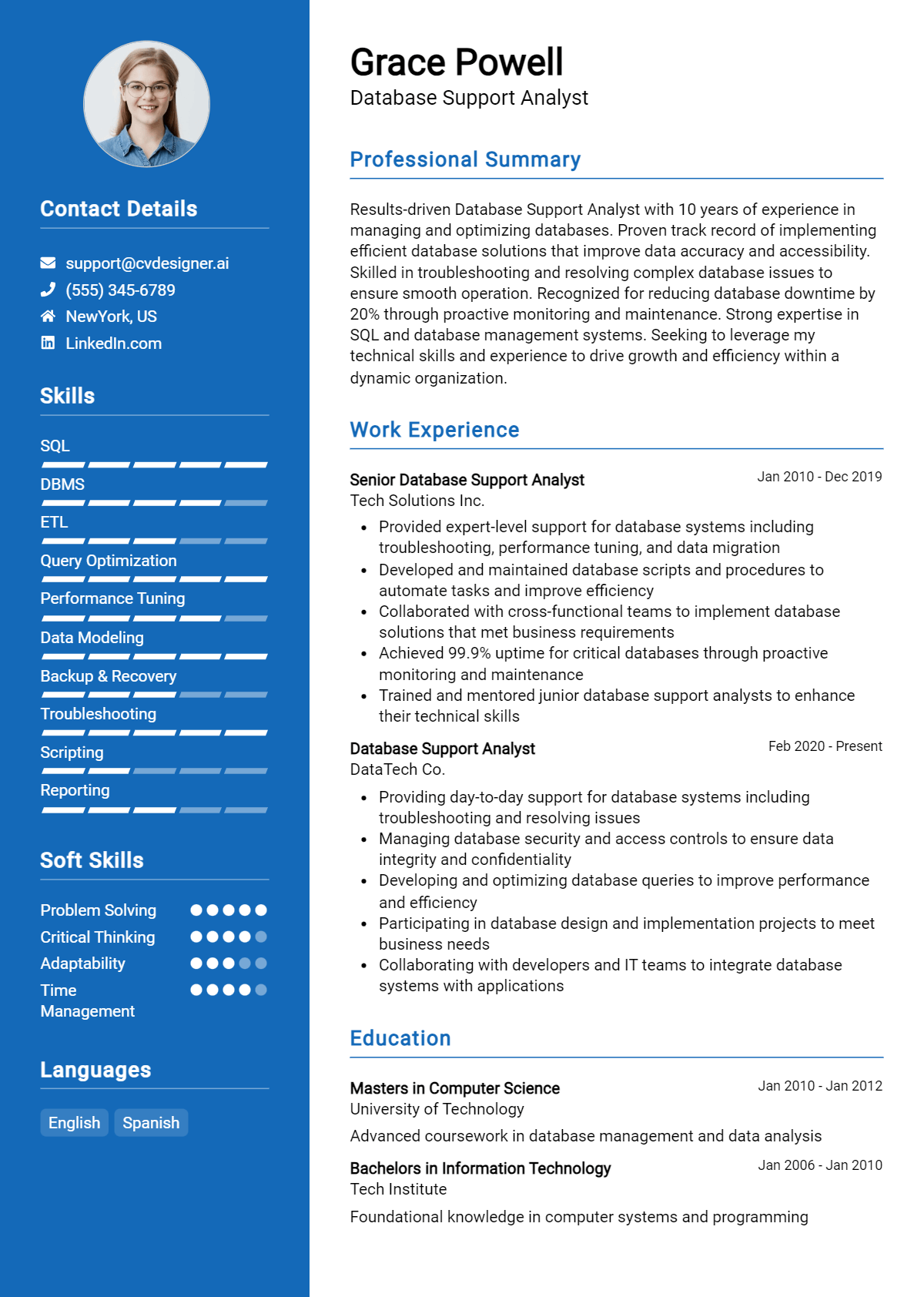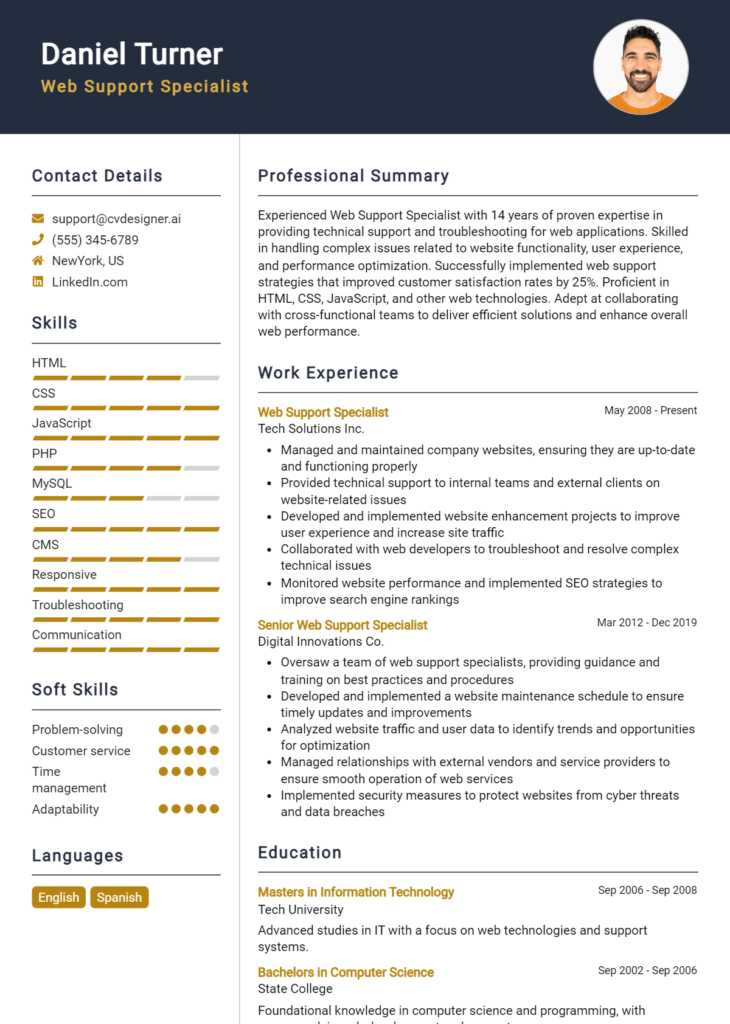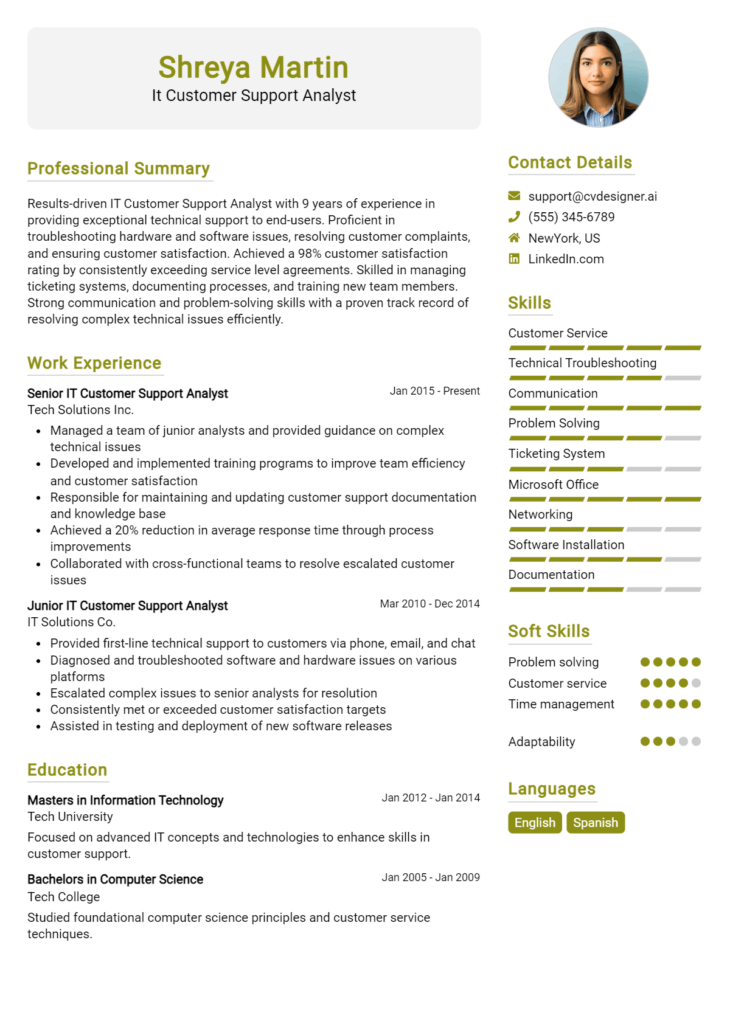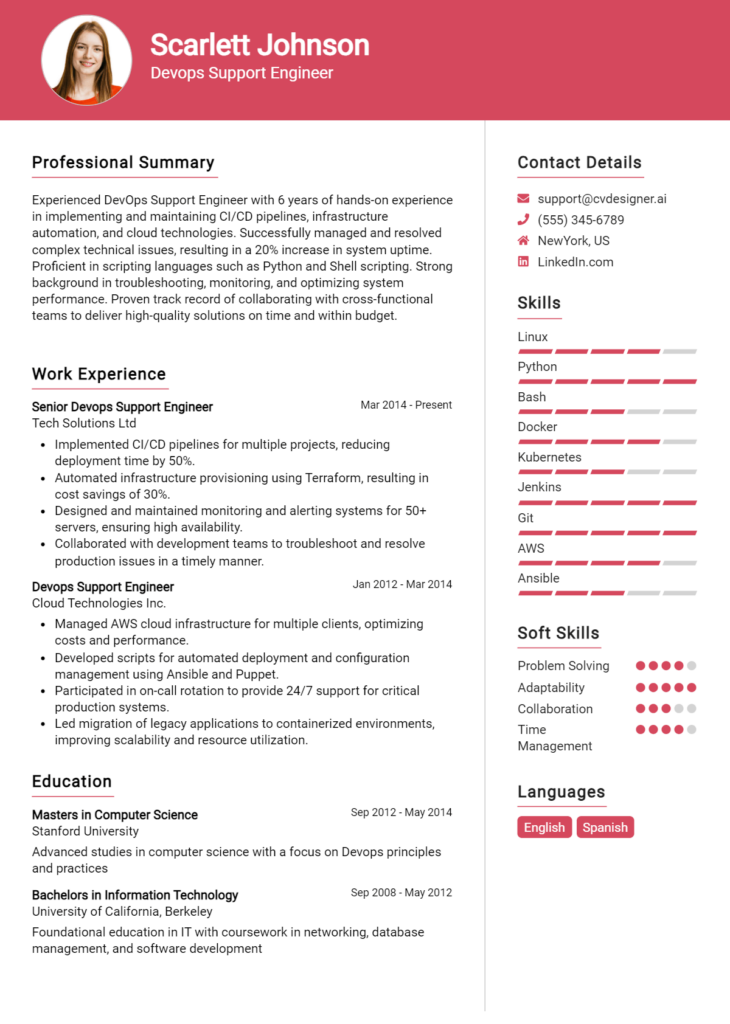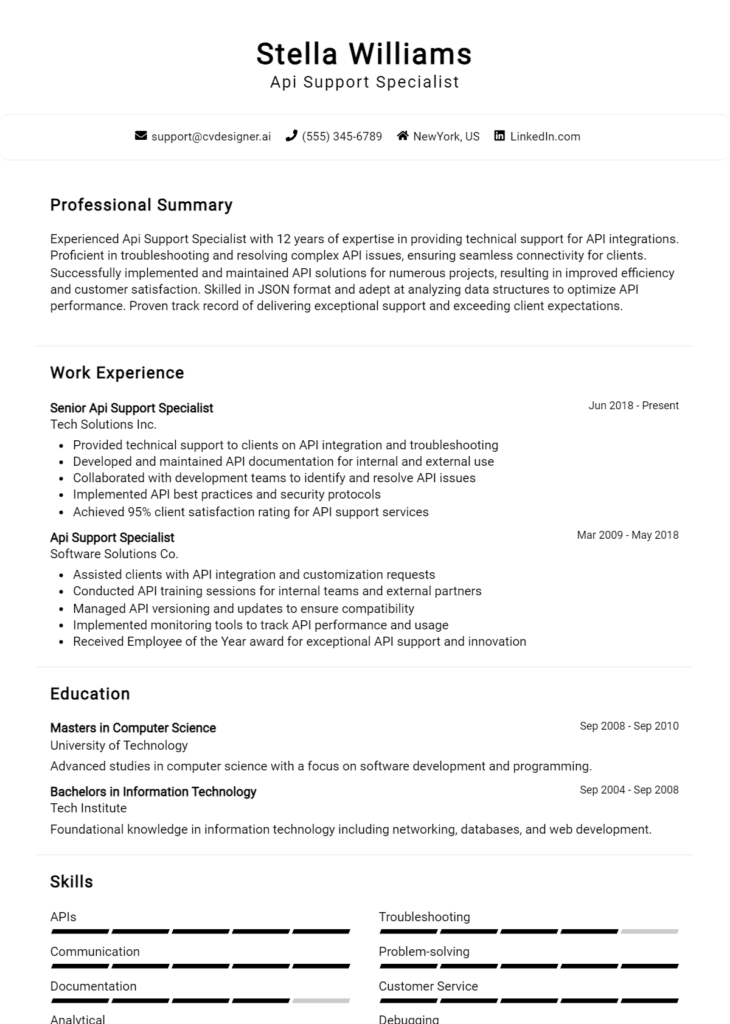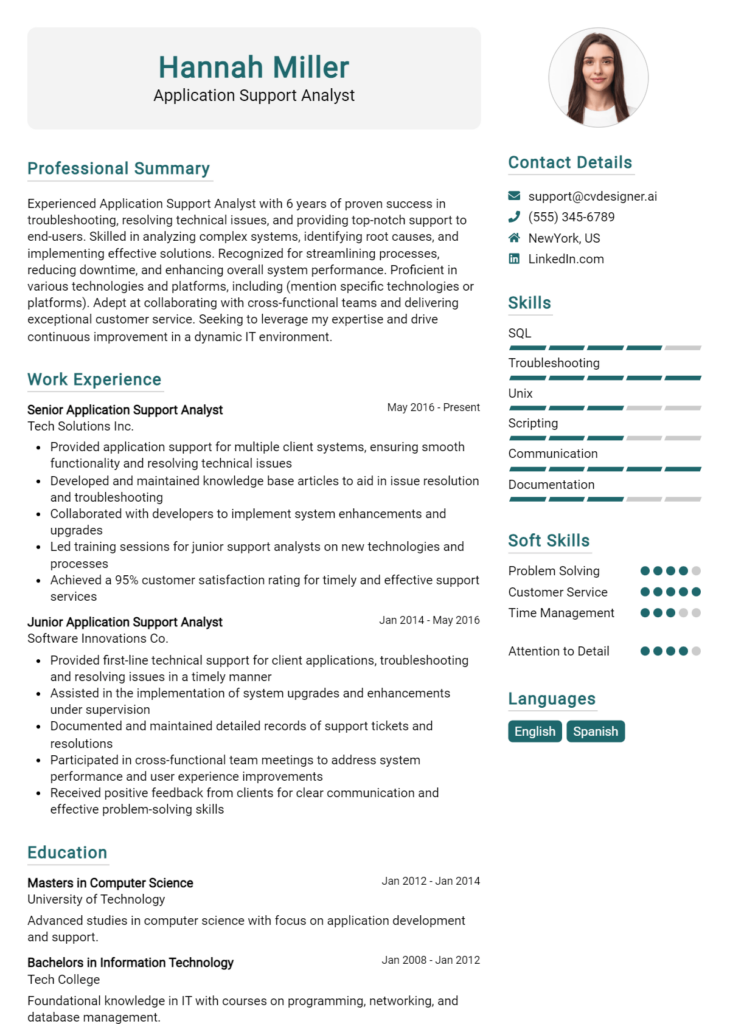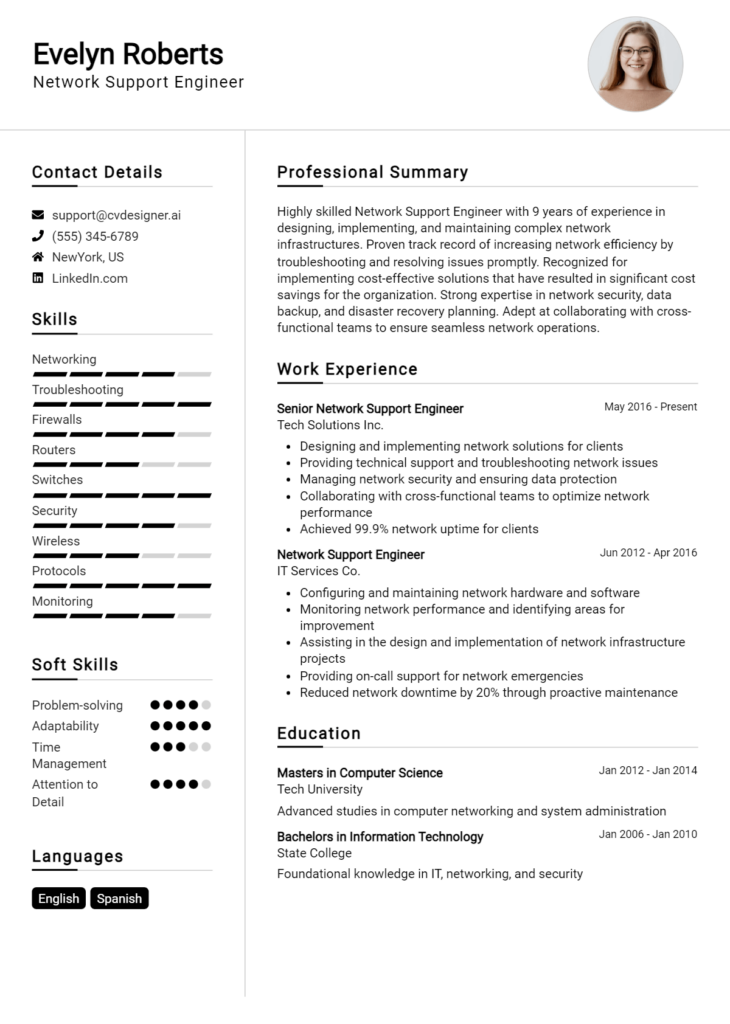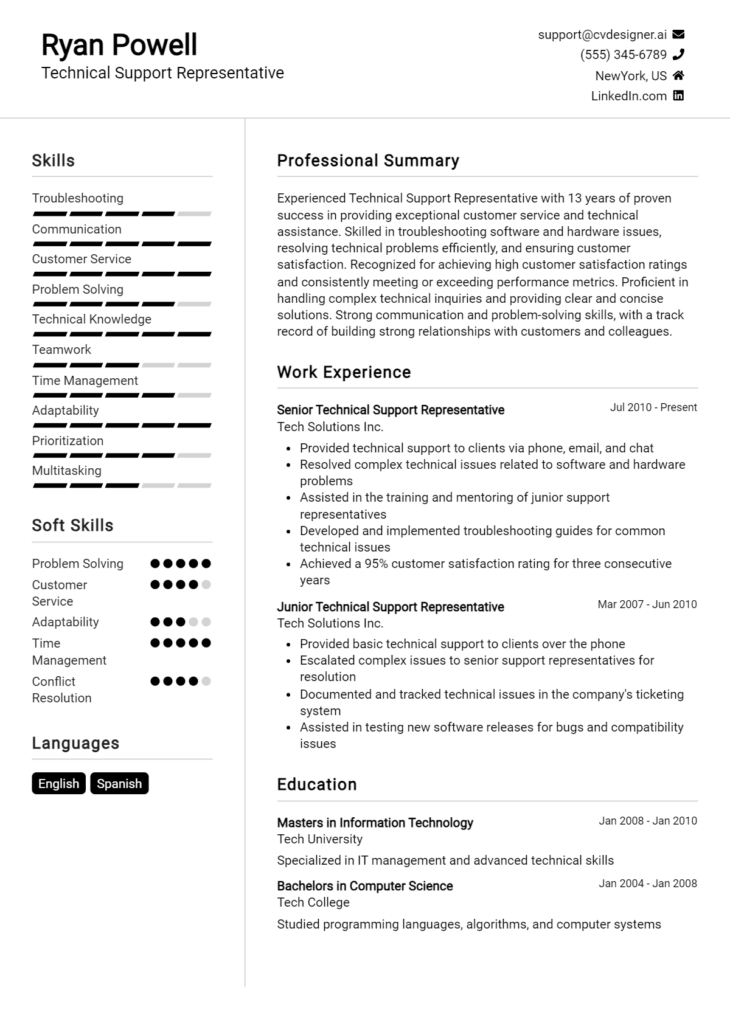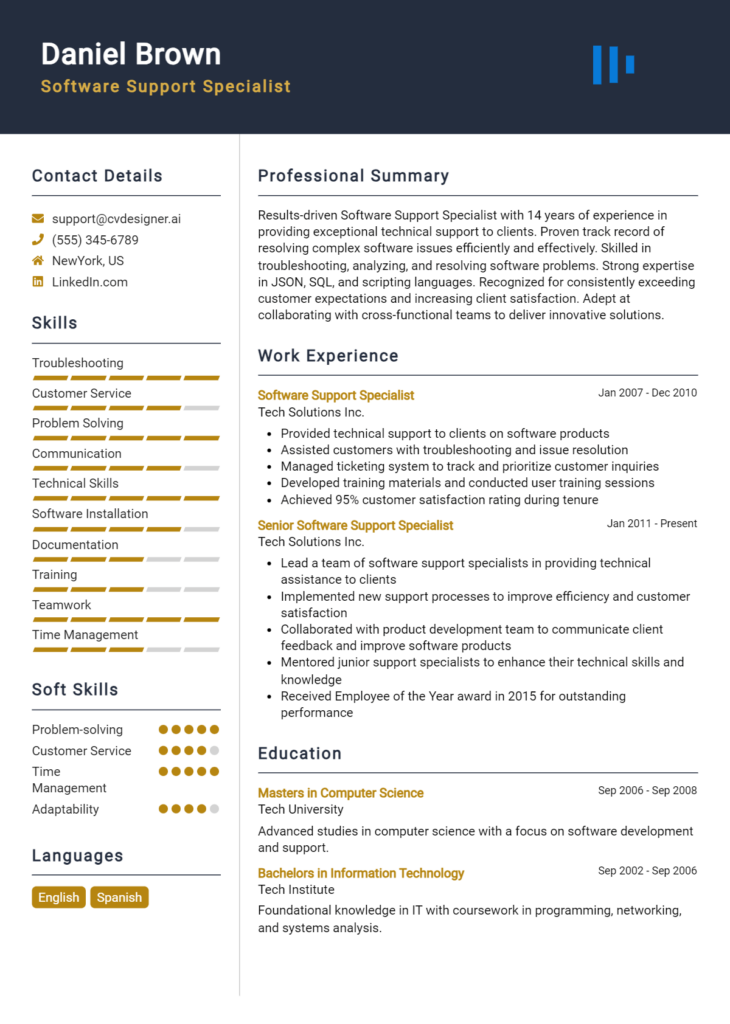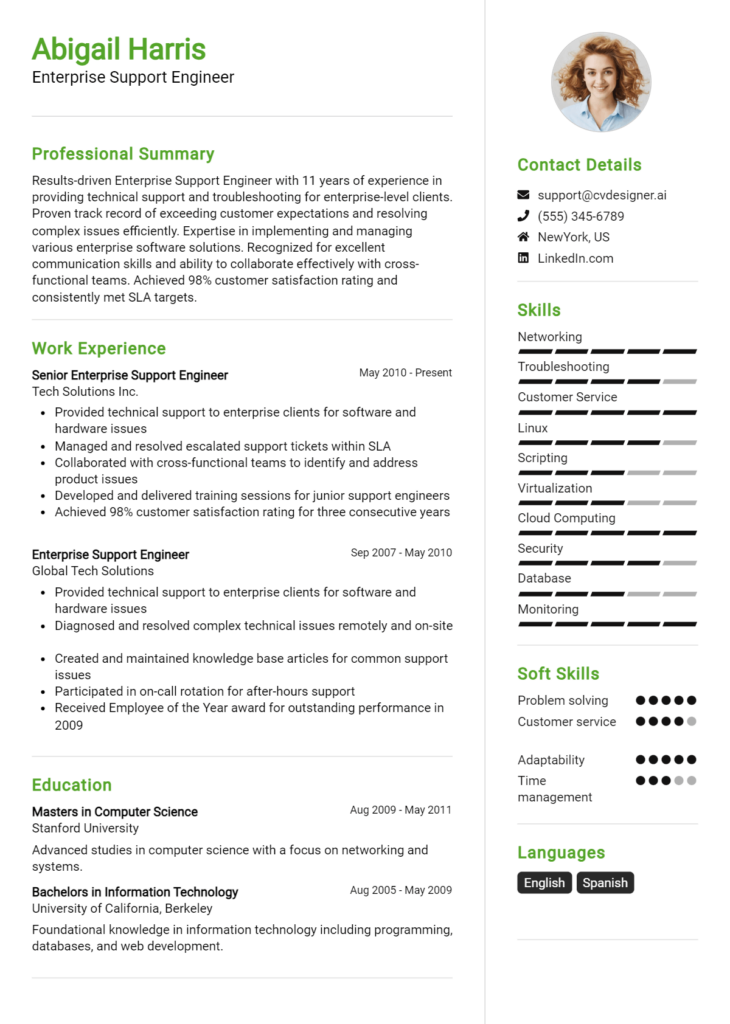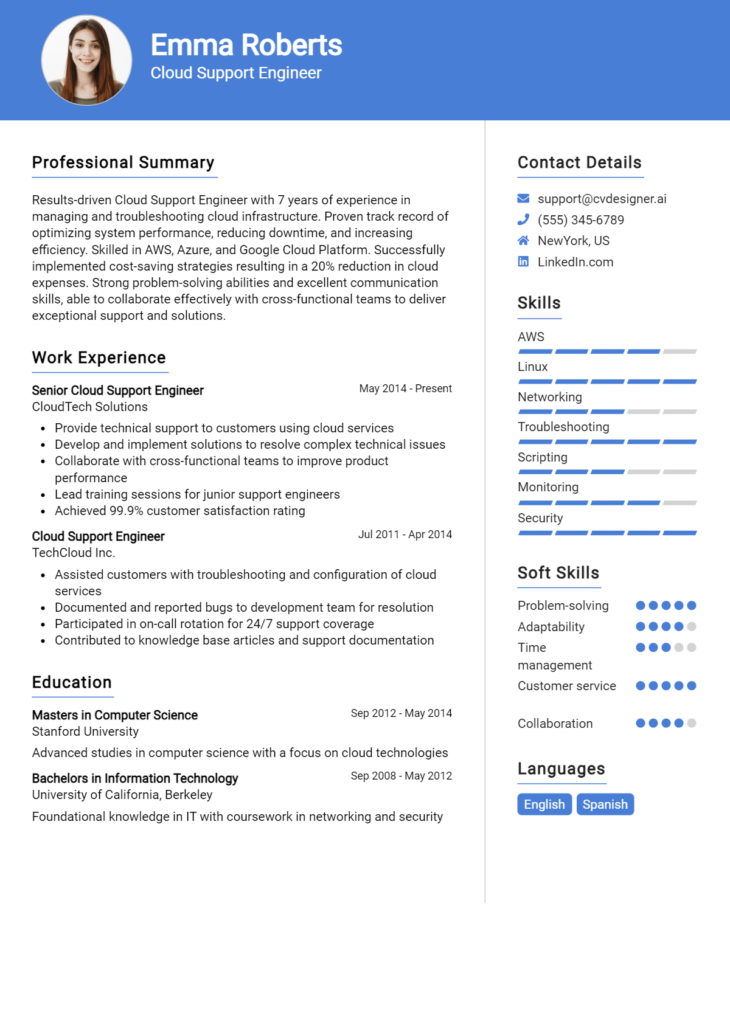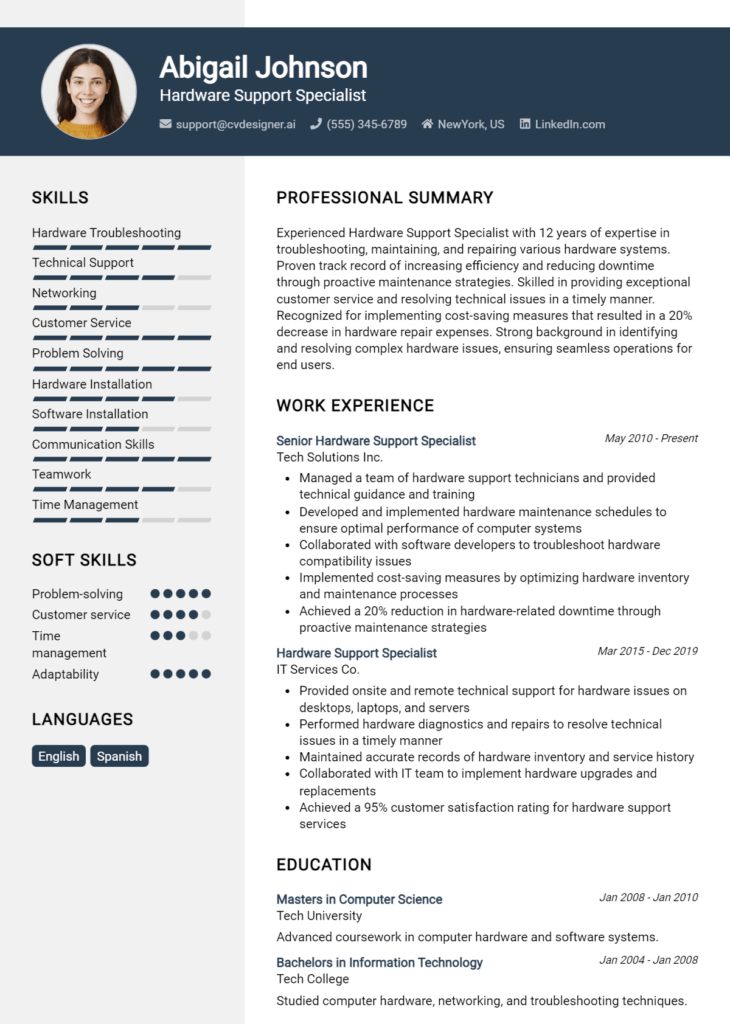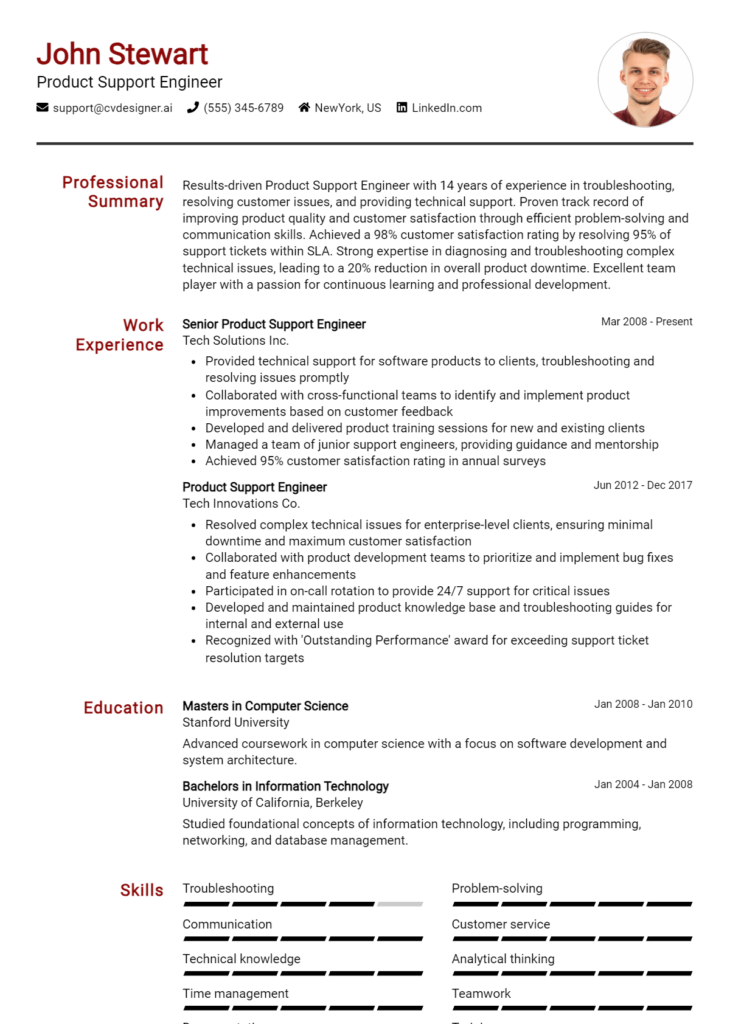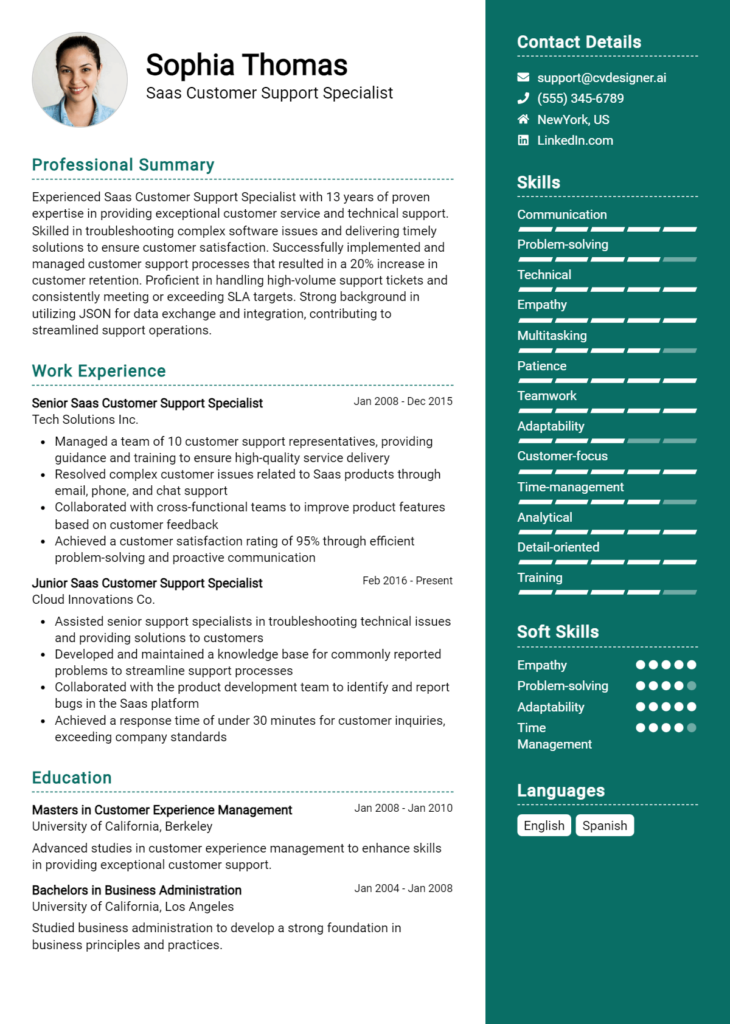Database Support Analyst Core Responsibilities
A Database Support Analyst plays a crucial role in ensuring data integrity and availability across various departments. Their core responsibilities include monitoring database performance, troubleshooting issues, and implementing upgrades. Strong technical skills in database management systems, along with operational expertise and problem-solving abilities, are essential for success in this role. By effectively bridging the gap between IT and business units, Database Support Analysts help achieve organizational goals. A well-structured resume should highlight these qualifications, showcasing the analyst's impact on overall efficiency and productivity.
Common Responsibilities Listed on Database Support Analyst Resume
- Monitor and optimize database performance and reliability.
- Troubleshoot and resolve database-related issues promptly.
- Implement and maintain database security measures.
- Assist in database design, development, and upgrades.
- Collaborate with IT teams to ensure data integrity.
- Provide technical support and training to end-users.
- Document database processes and procedures.
- Conduct regular backup and recovery operations.
- Analyze and interpret data to support business decisions.
- Maintain updated knowledge of database technologies and trends.
- Prepare reports on database performance and usage statistics.
- Coordinate with cross-functional teams to align data strategies.
High-Level Resume Tips for Database Support Analyst Professionals
A well-crafted resume is crucial for Database Support Analyst professionals, as it serves as the first impression a candidate makes on potential employers. In a competitive job market where technical skills and analytical abilities are paramount, your resume must effectively showcase not only your skills but also your achievements in the field. It should reflect your expertise in database management, troubleshooting, and support, while also demonstrating your ability to contribute to an organization's success. This guide will provide practical and actionable resume tips specifically tailored for Database Support Analyst professionals, helping you to stand out from the crowd and secure that coveted interview.
Top Resume Tips for Database Support Analyst Professionals
- Tailor your resume to match the job description by incorporating relevant keywords and phrases.
- Highlight your technical skills, such as proficiency in SQL, database design, and data modeling.
- Showcase relevant experience by focusing on past roles that involved database management and support.
- Quantify your achievements with specific metrics, such as reduced downtime or improved database performance.
- Include any relevant certifications, such as Oracle Certified Professional or Microsoft Certified Database Administrator.
- Demonstrate your problem-solving abilities by providing examples of complex issues you've resolved.
- Highlight your familiarity with various database management systems (DBMS) like MySQL, PostgreSQL, or MongoDB.
- Incorporate soft skills, such as communication and teamwork, which are essential for collaborating with other IT professionals.
- Keep your resume concise, ideally one page, while ensuring it is well-organized and easy to read.
- Proofread your resume meticulously to avoid any grammatical or spelling errors, as they can detract from your professionalism.
By implementing these tips, you can significantly enhance your resume and increase your chances of landing a job in the Database Support Analyst field. A well-structured and tailored resume will not only demonstrate your qualifications but also show potential employers that you are serious about your career and prepared to make a valuable contribution to their organization.
Why Resume Headlines & Titles are Important for Database Support Analyst
In the competitive landscape of job applications, a well-crafted resume headline or title is crucial for a Database Support Analyst. This succinct phrase serves as the first impression for hiring managers, instantly capturing their attention and summarizing the candidate's key qualifications. A strong headline is not only concise and relevant but also directly tied to the job being applied for, effectively positioning the candidate as a suitable fit. By presenting essential skills and experiences in an impactful manner, a compelling headline can significantly enhance the chances of being noticed in a crowded applicant pool.
Best Practices for Crafting Resume Headlines for Database Support Analyst
- Keep it concise: Aim for one impactful sentence or phrase.
- Be role-specific: Tailor the headline to reflect the Database Support Analyst position.
- Highlight key skills: Incorporate essential technical skills relevant to the role.
- Showcase experience: Mention years of experience or notable achievements.
- Use strong action words: Choose verbs that convey competence and proactivity.
- Incorporate industry keywords: Use relevant terminology that aligns with the job description.
- Avoid jargon: Ensure clarity for readability and understanding by hiring managers.
- Make it memorable: Craft a headline that stands out and resonates with hiring managers.
Example Resume Headlines for Database Support Analyst
Strong Resume Headlines
Experienced Database Support Analyst Specializing in SQL and Data Integrity
Detail-Oriented Database Analyst with 5+ Years in Performance Tuning and Troubleshooting
Results-Driven Database Support Expert with Proven Track Record in System Optimization
Weak Resume Headlines
Database Support Analyst
Looking for a Job in IT
The strong headlines are effective because they immediately communicate the candidate's specific expertise and years of experience, making it clear why they are a strong fit for the Database Support Analyst role. They highlight relevant skills and achievements that set the candidate apart. In contrast, the weak headlines fail to impress because they are too generic and lack specificity, providing little insight into the candidate's qualifications or what they bring to the table. Such vague titles do not capture the interest of hiring managers who seek qualified candidates that align closely with their job requirements.
Writing an Exceptional Database Support Analyst Resume Summary
A well-crafted resume summary is essential for a Database Support Analyst, as it serves as the first impression for hiring managers. This brief yet impactful section allows candidates to quickly showcase their key skills, relevant experience, and significant accomplishments that align with the job role. In a competitive job market, a strong summary can capture the attention of hiring managers and encourage them to delve deeper into the resume. It should be concise, compelling, and tailored specifically to the job description, effectively highlighting what makes the candidate a perfect fit for the position.
Best Practices for Writing a Database Support Analyst Resume Summary
- Quantify Achievements: Use specific metrics to demonstrate the impact of your work, such as improvements in database performance or reductions in downtime.
- Focus on Skills: Highlight technical skills relevant to database support, such as SQL proficiency, data migration expertise, and troubleshooting capabilities.
- Tailor the Summary: Customize your summary for each job application, ensuring it addresses the specific requirements and keywords from the job description.
- Be Concise: Keep the summary to 3-5 sentences, making every word count and avoiding unnecessary jargon.
- Showcase Relevant Experience: Mention past roles or projects that directly relate to the responsibilities of a Database Support Analyst.
- Use Active Language: Employ strong action verbs to convey confidence and proactivity in your approach to database management and support.
- Highlight Soft Skills: Incorporate interpersonal skills, such as problem-solving and communication, which are critical for collaborating with teams and stakeholders.
- Proofread: Ensure that the summary is free from grammatical errors and typos, as attention to detail is crucial in database roles.
Example Database Support Analyst Resume Summaries
Strong Resume Summaries
Detail-oriented Database Support Analyst with over 5 years of experience optimizing database performance, resulting in a 30% increase in query efficiency. Proficient in SQL, Oracle, and troubleshooting complex database issues, with a proven track record of reducing downtime by 25% through proactive monitoring and support.
Results-driven Database Support Analyst with a strong background in data integrity and security, successfully implementing backup solutions that decreased data loss incidents by 40%. Skilled in communication and collaboration, ensuring seamless support for cross-functional teams.
Innovative Database Support Analyst with expertise in data migration and ETL processes, leading projects that improved data accessibility by 50%. Experienced in troubleshooting and resolving database-related issues, providing responsive support that enhanced user satisfaction ratings.
Weak Resume Summaries
Experienced database analyst looking to leverage skills in a new role. Familiar with databases and support tasks.
Database Support Analyst with knowledge of various database systems. Seeking opportunities to help organizations manage their data.
The examples of strong resume summaries effectively highlight specific achievements, relevant skills, and quantifiable results, making them compelling for hiring managers. In contrast, the weak summaries lack detail and specificity, failing to convey the candidate's unique qualifications or impact in previous roles. Strong summaries not only demonstrate the candidate's capabilities but also align closely with the expectations of the Database Support Analyst position, while weak summaries appear generic and unremarkable.
Work Experience Section for Database Support Analyst Resume
The work experience section of a Database Support Analyst resume is a critical component that highlights the candidate's technical skills, management capabilities, and commitment to delivering high-quality products. This section serves as a platform to demonstrate how previous roles have equipped the candidate with the necessary knowledge and expertise to tackle complex database issues, collaborate with teams, and enhance organizational performance. By quantifying achievements and aligning experiences with industry standards, candidates can effectively showcase their value and readiness for the role.
Best Practices for Database Support Analyst Work Experience
- Utilize clear and concise language to describe your responsibilities and achievements.
- Focus on technical skills relevant to database management, such as SQL, data modeling, and performance tuning.
- Quantify results wherever possible, using metrics to demonstrate the impact of your work.
- Highlight collaboration with cross-functional teams to show your ability to work effectively in a team environment.
- Include specific tools and technologies you have used, such as database management systems and monitoring tools.
- Tailor your experiences to match the job description, emphasizing skills and experiences that align with the role.
- Showcase any leadership roles or mentorship experiences to illustrate your ability to guide and support others.
- Provide context for your achievements to demonstrate the challenges faced and how you overcame them.
Example Work Experiences for Database Support Analyst
Strong Experiences
- Led a team of 5 analysts in optimizing database performance, resulting in a 30% reduction in query response time and improved user satisfaction scores.
- Implemented a new data backup strategy that decreased data loss incidents by 50%, ensuring business continuity and data integrity.
- Collaborated with software development teams to design and deploy a robust database architecture, which supported a 40% increase in application usage.
- Trained junior analysts on SQL best practices, leading to a 25% improvement in overall team efficiency and reduced error rates in database queries.
Weak Experiences
- Responsible for managing the database.
- Worked on various database-related tasks without specific outcomes.
- Assisted in some projects that involved database support.
- Performed routine checks on the database as required.
The examples above are considered strong or weak based on their clarity, specificity, and impact. Strong experiences provide clear, quantifiable results, showcasing the candidate’s technical expertise and leadership abilities. In contrast, weak experiences are vague and lack detail, failing to convey the candidate’s contributions or the significance of their work. Effective work experience statements should reflect a candidate's direct impact on projects and their ability to collaborate successfully with teams, thereby enhancing their overall profile for prospective employers.
Education and Certifications Section for Database Support Analyst Resume
The education and certifications section of a Database Support Analyst resume is crucial for showcasing the candidate's academic foundation and commitment to professional growth in the field of database management. This section not only highlights relevant degrees and industry-recognized certifications but also reflects the candidate's continuous learning efforts, which are vital in a field that evolves rapidly with technology. By providing pertinent coursework, specialized training, and credentials that align with the job role, candidates can significantly enhance their credibility and demonstrate their readiness to take on challenges within database support roles.
Best Practices for Database Support Analyst Education and Certifications
- Choose relevant degrees and certifications that align closely with the job description.
- Include specific coursework that demonstrates expertise in database management, SQL, and data analysis.
- List only current and recognized certifications to ensure credibility.
- Highlight advanced degrees (e.g., Master's in Information Systems) to showcase advanced knowledge.
- Include any specialized training or workshops that pertain to database technologies.
- Maintain clarity and conciseness; avoid unnecessary details that could dilute the impact.
- Use consistent formatting to enhance readability and professionalism.
- Update this section regularly to reflect the latest qualifications and skills acquired.
Example Education and Certifications for Database Support Analyst
Strong Examples
- Bachelor of Science in Computer Science, ABC University, 2020
- Oracle Certified Professional (OCP) - Database Administrator
- Microsoft Certified: Azure Database Administrator Associate
- Coursework: Advanced SQL Queries, Database Design, Data Warehousing Techniques
Weak Examples
- Associate Degree in General Studies, XYZ Community College, 2018
- Certification in Microsoft Office Suite (2015)
- Coursework: Introduction to Computer Science (not database-focused)
- Old certification: MySQL Database Administrator (obtained in 2012)
The examples listed as strong are considered effective because they directly relate to the skills and knowledge required for a Database Support Analyst, showcasing relevant degrees, recognized certifications, and specific coursework that enhances the candidate's suitability for the role. In contrast, the weak examples fail to demonstrate relevance to database management, featuring outdated or unrelated qualifications that do not contribute to the candidate's credibility in this specific job market.
Stand Out with a Winning Database Support Analyst Cover Letter
I am writing to express my interest in the Database Support Analyst position at [Company Name], as advertised on [Where You Found the Job Posting]. With a strong background in database management and a passion for providing exceptional technical support, I am confident in my ability to contribute effectively to your team. My experience in troubleshooting database issues, optimizing performance, and ensuring data integrity aligns well with the requirements of this role.
In my previous role at [Previous Company Name], I successfully managed a variety of database systems, including SQL Server and Oracle. I was responsible for monitoring database performance, executing routine maintenance, and implementing backup and recovery procedures. My proactive approach allowed me to identify potential issues before they escalated, ensuring minimal downtime for critical applications. Additionally, my collaboration with cross-functional teams to gather requirements and provide training on database usage enhanced user adoption and satisfaction.
I am particularly drawn to [Company Name] due to its commitment to innovation and excellence in the tech industry. I admire your focus on leveraging data to drive business decisions and improve user experiences. I am eager to bring my analytical skills and technical expertise to your organization, contributing to your ongoing success and supporting your team in delivering high-quality database solutions.
Thank you for considering my application. I look forward to the opportunity to discuss how my background, skills, and enthusiasm for database support can benefit [Company Name]. I am excited about the possibility of joining your team and contributing to the innovative projects that [Company Name] is known for. Please feel free to contact me at [Your Phone Number] or [Your Email Address] to arrange a conversation.
Common Mistakes to Avoid in a Database Support Analyst Resume
When crafting a resume for a Database Support Analyst position, it’s crucial to present your skills and experiences effectively to stand out in a competitive job market. However, many applicants make common mistakes that can detract from their qualifications and diminish their chances of landing an interview. By understanding and avoiding these pitfalls, you can create a more compelling resume that highlights your expertise in database management and support.
Lack of Keywords: Failing to incorporate relevant industry keywords can result in your resume being overlooked by applicant tracking systems (ATS) that screen for specific terms related to database technologies and support.
Vague Job Descriptions: Using generic descriptions for past roles can leave hiring managers unclear about your actual responsibilities and accomplishments. Instead, provide specific details about your contributions and the impact of your work.
Ignoring Technical Skills: Not prominently featuring your technical skills, such as proficiency in SQL, database management systems, or data analysis tools, can lead to an incomplete representation of your qualifications.
Overloading with Jargon: While technical terminology is important, excessive jargon can alienate non-technical readers. Strive for a balance that showcases your expertise while remaining accessible.
Not Quantifying Achievements: Neglecting to include quantifiable achievements can weaken your resume. Use metrics to highlight how you improved database performance, reduced downtime, or enhanced user satisfaction.
Poor Formatting: A cluttered or inconsistent format can make your resume difficult to read. Ensure clarity and professionalism by using clean, organized layouts with appropriate headings and bullet points.
Omitting Soft Skills: While technical skills are essential, soft skills such as problem-solving, communication, and teamwork are equally important in a support role. Be sure to include examples of how you’ve utilized these skills.
Neglecting Continuous Learning: Failing to mention any recent training, certifications, or ongoing education can signal a lack of commitment to professional growth in a rapidly evolving field.
Conclusion
As a Database Support Analyst, your role is pivotal in ensuring the smooth operation and management of an organization’s database systems. Throughout this article, we covered the essential skills required for the position, including proficiency in SQL, experience with database management tools, and the importance of problem-solving and analytical skills. We also highlighted the significance of having strong communication abilities to collaborate effectively with IT teams and end-users.
Moreover, we discussed the typical responsibilities you might encounter, such as monitoring database performance, troubleshooting issues, and implementing upgrades. Understanding these aspects is crucial for anyone looking to excel in this field.
Now that you have a clearer picture of what it takes to succeed as a Database Support Analyst, it’s time to evaluate your own qualifications. Take a moment to review your resume and ensure it showcases your relevant skills and experiences effectively.
To assist you in this process, consider utilizing helpful resources such as resume templates, which can provide a professional layout for your information. If you're looking for a more guided approach, try the resume builder, which simplifies the creation of your resume. Additionally, you can explore resume examples to gain inspiration from others in your field. Finally, don’t forget about the importance of a compelling introduction with cover letter templates that can help you stand out to potential employers.
Take action today and ensure your resume reflects the qualifications that will make you a top candidate for a Database Support Analyst position!

